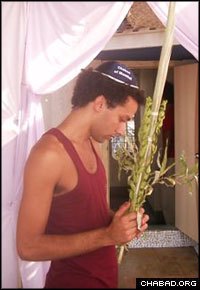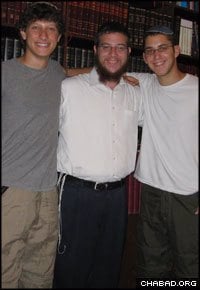Less than an hour before suspected Islamic terrorists stormed the Chabad-Lubavitch center in Mumbai, India, its directors were discussing matters of faith with a visiting Israeli backpacker.
Moshe Weisner, 22, was one of the last people to see Rabbi Gavriel and Rivkah Holtzberg alive, having left the Chabad House – also known as the Nariman House – about 20 minutes before gunmen entered the Colaba neighborhood building. He came to the Chabad House for dinner, a familiar experience for the thousands of Jewish tourists and businesspeople who annually traveled to Mumbai during the Holtzbergs’ years there. Afterwards, he had a discussion with Gavriel Holtzberg about G‑d and Jewish leadership, during which the rabbi showed him a video about the Rebbe, Rabbi Menachem M. Schneerson, of righteous memory.
There were “maybe 12 people” left in the building when he and a friend exited, including kosher supervisors Rabbi Leibish Teitelbaum, a U.S. born scion of the Volover Chasidic dynasty, and Bentzion Chroman, an Israeli from the town of Bat Yam; Yocheved Orpaz, an Israeli woman who was visiting India with her daughter and grandchildren; and a Jewish woman from Mexico who was about to immigrate to Israel on Dec. 1. They all perished in the attack, part of the one of the worst terrorist incidents to strike India.
“Gabi was a very patient man, not like a lot of people I spoke with about G‑d,” said Weisner, who is trekking across Asia after completing his mandatory service in the Israel Defense Force. “He was a very good man. We were sitting with Gabi and Rivky, and we talked about the Rebbe’s ideas. After this, we left a little money for the Chabad House for the dinner and went down for a smoke.
“We came back up to say goodbye,” continued Weisner, who stayed in the guest house operated by the Holtzbergs. “He said he would see us in the morning to bless us before we left.”
Such outgoing hospitality was the norm for the Holtzbergs, attested Marc Schwalb, a Belgian businessman who frequently found himself in the Indian financial center of Mumbai. Whenever he was in town, Schwalb would go to the Chabad House, as he did the night before the attacks and the Shabbat before that.
“I prayed with Rabbi Gavriel on Friday night and Shabbat morning at the Knesset Eliyahu synagogue, the Iraqi synagogue where he reads from the Torah” and gives a short sermon, said Schwalb, who was staying at the Oberoi Hotel when terrorists took over that building. “On Friday, I went to the Shabbat meal at the Chabad House. Everyone was there. There was a professor from Los Angeles, another guy from Kfar Tabor, Israel, a local Israeli, two girls working for the Joint Distribution Committee – one from Chicago and one from New York.”
How the Holtzbergs conducted the Shabbat proceedings at their dinner table is legendary among the people who visited.
Writing for JTA, Benjamin Holtzman from Sydney, Australia, told of the sea of humanity that came by the Chabad House when he was there visiting.
“They were wonderful people: warm, inviting and engaging,” said Holtzman. “Gabi would get visibly excited to have so many guests for Shabbat; you could tell it really made his week. He would have a grin on his face almost the entire meal, including during his dvar Torah.
“He was always so eager to create a communal feeling that he insisted everyone go around the table and say a few words to the group, giving guests four options: either delivering a dvar Torah, relating an inspirational story, declaring to take on a mitzvah or leading a song,” continued Holtzman. “As most of the guests were Israeli backpackers and other passers-through, they might have found this quite novel. For us regulars, it was just Gabi’s shtick.”

Painful Recollections
Schwalb related that over the years, he got to know the Holtzbergs fairly well. They even gave him a tour of the building Tuesday night, urging him to stay with them during his next trip instead of a hotel.
“I always tried to avoid Shabbat in Mumbai, but if you wanted to stay for Shabbat, you had where to go,” said Schwalb, a 66-year-old native of Antwerp. “It’s the same thing in Shanghai and Bangkok: Wherever there’s a Chabad House, you’re always welcome.”
The Holtzbergs had “special souls,” he said. Anyone “who spends five and a half years in Mumbai, and sits there with self sacrifice with a child, knowing that G‑d knows if there’s going to be a minyan when you pray, you have to have a special soul.”
After surviving his own ordeal – the businessman barricaded himself in his room on the 19th floor of the Oberoi Hotel until Indian commandos rescued him on Friday – Schwalb plans to make a festive meal to thank G‑d for his deliverance.

“I still cry terribly,” he said. “I didn’t known that when I said goodbye to Rav Gavriel that it would be forever. It’s terrible.”
The last known contact occupants of the Chabad House had with the outside world was a frantic phone call Gavriel Holtzberg placed to the security desk at the local Israeli Consulate. The line went dead in the middle of the conversation.
When word spread of the attack on the Chabad House, Weisner and his fellow travelers tried to reach the building, but were turned back by police. He left Mumbai on Friday, before the bodies were removed from the Chabad House by Israeli forensic teams. On Sunday, he spoke by phone from the beach destination of Kochi near India’s southern tip.
“I’m still shocked,” said Weisner. “I’m still carrying on, but I think about it all the time. Me and my friend talk about it all the time.
“Please G‑d, we’ll see better days.”









Join the Discussion